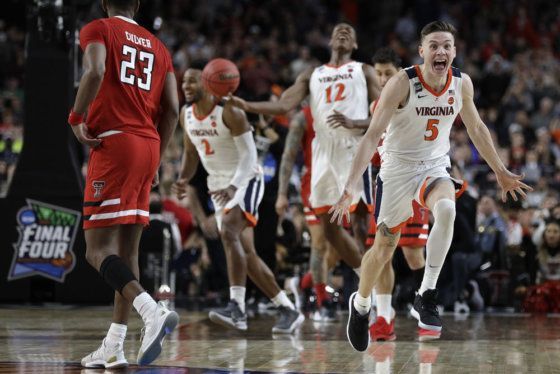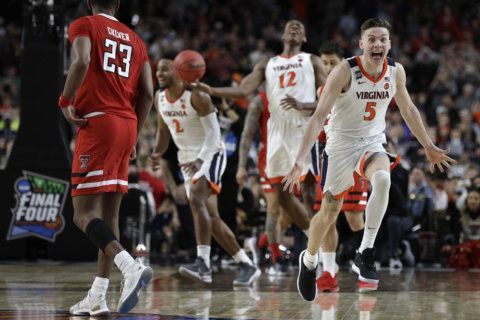From devastation in Charlotte to a championship return to Charlottesville, it’s been an unbelievable year and three weeks for the Virginia Cavaliers.
You could have forgiven head coach Tony Bennett and his crew for listening to all the voices, the ones saying, “The regular season success is just a gimmick. The system doesn’t work in March.” You could have understood if they felt they needed some new identity, to cleanse themselves of the taste of last year.
But if they were going to do the thing, to capture ultimate, unequivocal redemption in the eyes of every basketball fan after last year’s first-round humiliation against UMBC, they were going to have to stay true to who they were and trust that the formula that got them back to March again, once more a 1-seed, was the one that would win them a title.
At halftime Monday night, Charles Barkley and Kenny Smith bemoaned Virginia’s methodical, conservative offensive approach, shying away from open shots. But the commentators missed, or neglected, two crucial factors.
The first was Texas Tech’s aggressive, swarming, denial defense, which often made it tough for Virginia to even get into sets. The second was in the clips they chose, both showing freshman guard Kihei Clark passing up early-shot clock three-pointers.
Clark isn’t the primary, secondary, or even tertiary option on his team. He’s the sixth-leading scorer, at less than five points per game. He’s a respectable 34 percent shooter from outside, but that doesn’t compare to DeAndre Hunter (44 percent), Kyle Guy (43 percent), or Ty Jerome (40 percent). Him pulling up with 20 seconds left on the shot clock isn’t and has never been Virginia’s game plan.
For all the talk about their relentless, pack line defense, the Cavaliers beat you just as much with their pace, grinding out every possession and making you play on your heels for 30 seconds each trip down the floor. Their defense is good because of their discipline and intensity, yes, but also because by the time you finally have the ball, they’ve taken every ounce of energy they can squeeze from you on the other end.
Virginia’s goal is never to hit you over the head with a sledgehammer of scoring. It’s to grind you slowly, methodically into a fine powder, until you go up for that crucial jumper and your legs are nothing but dust.
Ask Oregon’s Louis King who, after putting the Ducks ahead late in the Round of 16 with his fourth three-pointer in five attempts, finished 0-4 (0-3 from deep) with a turnover in the final five minutes. Ask Purdue’s Carsen Edwards who, after lighting Virginia on fire and hitting what looked like it might be a game-winning bank shot with 1:11 to play, finished just 1-4 with two turnovers the rest of regulation and overtime in the Elite Eight. Ask Texas Tech’s Matt Mooney, thinking he had hit his stride Monday night, only to find his crucial, late, deep three well off the mark.
And on the other side, refusing to die or give an inch, Virginia. At the end of their 38th game, their sixth NCAA Tournament game, their second overtime game in three contests, the Cavaliers knocked down all 12 of their free throws in overtime of the championship game.
To Barkley’s credit, he got one thing right in the postgame. The biggest difference between this year’s Virginia team and last year’s wasn’t anything mystical or transformative. It was a healthy DeAndre Hunter.
Casual followers probably had no idea he was even missing in last year’s loss to UMBC, the 2018 ACC Sixth Man of the Year having broken his wrist in the conference tournament. Hunter scored a game-high 27 points Monday night, none bigger than his enormous three from the corner to tie the game with just 12.9 seconds remaining, sending it to overtime.
The shot was emblematic of everything Virginia showed from the moment it fell behind by 14 points in the first half on the first afternoon of the tournament to Gardner-Webb. The Cavaliers’ nerves were visibly frayed, turning the ball over, playing out of pace, looking every bit the team that lost to UMBC the year before.
They calmed down, got back to what they do best, with Hunter scoring 17 of his game-high 23 in the second half. Monday night, amid the chaos, he gathered himself like he was in shoot around at the gym, calmly setting his feet and letting fly a perfect splash.
The game was not without those Virginia moments, though. The Cavaliers took, then blew, a 10-point lead in both halves. And just when it looked like they had come up with the stop that would get the game to overtime, Hunter tried to get the ball to Guy while Guy turned to call timeout, to try to preserve the four seconds and change left on the clock. The ball bounced out of bounds, back to Texas Tech, one second on the clock.
After everything it took to get here, they couldn’t really lose like this, could they?
Whatever gods have frowned upon Virginia in every past heartbreaking loss, they smiled Monday night, or at least turned their heads.
At the end of a year and three weeks of 16-over-1 jokes, of having to worry with each loss that one bad half of basketball would continue to define a program that has won 30 games four of the last six years, of surviving overtime not once, but twice on their quest, Virginia stands alone. And they did it their way.






